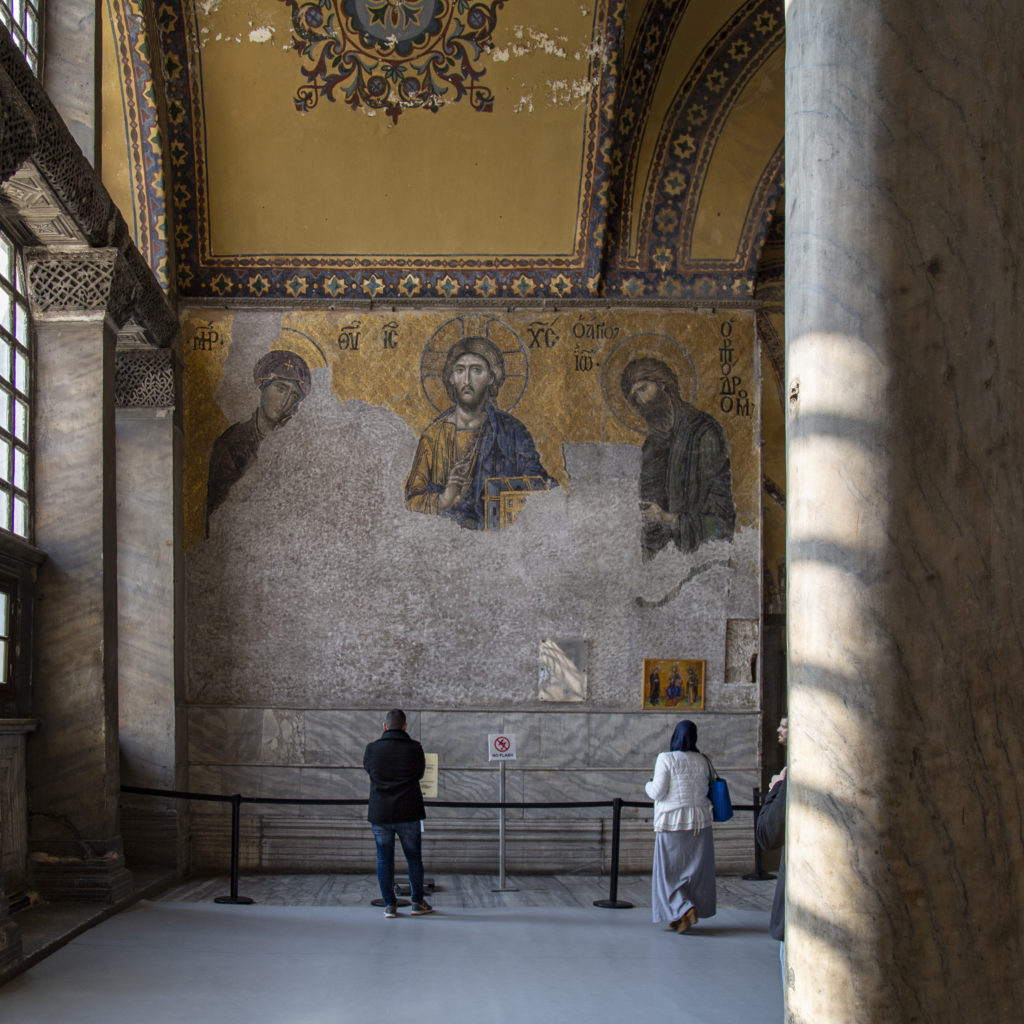
Published December 29, 2022
History is a great teacher. According to oral tradition, when Emperor Justinian walked into the completed Church of the Holy Wisdom (Hagia Sophia) on December 27, A.D. 537, he stared in silence for a long time at the immense beauty of the basilica he had commissioned before finally whispering, “Solomon, I have surpassed you.”
He was probably right. Hagia Sophia was the artistic triumph of a millennium. For 916 years, it permeated the daily life of the imperial city of Constantinople. No church anywhere in Christendom matched its scale or grandeur. Over the centuries, it became a symbol of Byzantine civilization. Orthodox Christians saw it as the center of their faith and a foretaste of heaven, described by one sixth-century writer as a place where “the golden stream of [God’s] glittering rays pours down and strikes the eyes of men, so that they can scarcely bear to look.”
Precisely for this reason, the first act of the city’s Muslim conquerors in A.D. 1453, as they sacked the city, was to convert this astonishing Christian church to a mosque. Over the following centuries, Muslim rulers destroyed or commandeered nearly all of the city’s remaining Christian churches. Even today, in modern Turkey, harassment of the Christian minority continues, often with the deliberate destruction of any physical evidence of the Christian past.
Hagia Sophia was closed as a Muslim worship site in 1931 by a then-aggressively secularist government. It reopened in 1935 as a museum but was again reconstituted as a mosque in 2020. Turkey has never acknowledged its guilt for the genocide of roughly 1 million Armenian Christians living within its borders in the late 19th and early 20th centuries. And today barely 100,000 Christians remain in Turkey, a nation of 82 million with rising Islamist sentiments. A mere 600 Greek Orthodox families linger on in Istanbul (the former Constantinople), a city that once rivaled Rome for leadership of the Christian world.
We should reflect carefully on this history lesson. While European birth rates drop, and a secularized Europe spurns its Christian roots, Muslim immigration continues. Thus, as Christopher Caldwell detailed more than a decade ago, the religious and cultural landscape of Europe is dramatically changing – a trend further accelerated by high Muslim birth rates. Some Church leaders have begun to express concern. They’re right to do so.
Islam claims a common ancestry with Judaism and Christianity rooted in Abraham. But despite its formal respect for Jesus and Mary, it has very little in common with Christian faith. Islam denies the Trinity, the Incarnation, and the Redemption. It denies the accuracy of the Gospels. It denies the origins and the purpose of the Church, and nearly every element of the Christian creeds. In fact, Islam acknowledges Judaism and Christianity simply to absorb them into its own story.
As St. John Paul II – hardly a Knight Templar – wrote in Crossing the Threshold of Hope:
Whoever knows the Old and New Testaments, and then reads the Koran, clearly sees the process by which it completely reduces Divine Revelation. [emphasis in original] It is impossible not to note the movement away from what God said about Himself, first in the Old Testament through the Prophets, and then finally in the New Testament through His Son. In Islam, all the richness of God’s self-revelation, which constitutes the heritage of the Old and New Testaments, has definitely been set aside. Some of the most beautiful names in the human language are given to the God of the Koran, but He is ultimately a God outside of the world, a God who is only Majesty, never Emmanuel, God-with-us. Islam is not a religion of redemption . . . For this reason, not only the theology but also the anthropology of Islam is very distant from Christianity.
As a result, Muslim-Christian coexistence has always been uncomfortable and often ugly, usually at Christian expense. Much of North Africa and the Middle East once had a flourishing Christian civilization. Muslim invasions submerged and erased it. The (Christian) Byzantine Empire had already been resisting Muslim expansion for 400 years when Pope Urban II preached the First Crusade in 1095. The Spanish expelled Muslim occupiers only in the 15th century. Muslim armies were turned back from Vienna as late as 1689. Much of the tragic religious and ethnic hostility in the Balkans today can trace its roots to four centuries of Ottoman Turk (i.e., Muslim) occupation and repression.
And these difficult relations are not something from the remote past. Islamist attacks on Nigerian Christians are common. Today, Christians in Muslim-dominated states like Sudan, Egypt, Iran, Pakistan, Turkey, Bangladesh, and Indonesia face everything from discrimination and harassment, to outright violence. The reason is simple. Prejudice against Jews and Christians has a long and unfortunate pedigree in Islam, despite claims to the contrary.
This doesn’t license abandonment of dialogue and earnest efforts at inter-religious cooperation. Human beings do have an instinct for love. On ground level, Muslim-Christian relations vary greatly and are often warm and mutually respectful. But it does demand that we bring realism, courage, and an accurate memory to our modern encounter with Islam. In the light of the Gospel, Mohammed is not a true prophet, and the Koran is not the Word of God. Muslims do not know the Jesus of John 14:6 – and without Christians who live their faith joyfully and vigorously, as an active witness to the Islamic world, they never will.
The last days of December are always a time for reflection; an opportunity to make sense of the past, take stock of the present, and set a course for the future. As Benedict XVI once noted, Christians are now the most persecuted religious community in the world. If we Christians who still have the blessings of religious freedom sleep, then the world our grandchildren inherit will be a world increasingly without the Cross, and without the truth.
Francis X. Maier is a senior fellow in the Catholic Studies Program at the Ethics and Public Policy Center. Mr. Maier’s work focuses on the intersection of Christian faith, culture, and public life, with special attention to lay formation and action.
Image by Byzantologist on Flikr
Francis X. Maier is a Senior Fellow in the Catholic Studies Program at the Ethics and Public Policy Center. Mr. Maier’s work focuses on the intersection of Christian faith, culture, and public life, with special attention to lay formation and action.











